Search
Search Results

Image
The Black Obelisk of Shalmaneser III, side A, 5th register
Tribute from Qarparunda the Patinean: silver, gold, tin, "fast" bronze, ivory (tusks), and ebony. Patina is modern Antakya, south of Turkey. From Nimrud, (ancient Kalhu), near the building of Shalmaneser, neo-Assyrian era, 827 BCE, Mesopotamia...
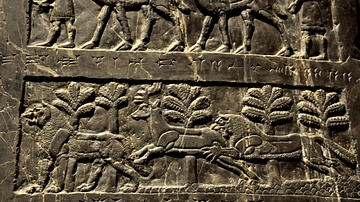
Image
The Black Obelisk of Shalmaneser III, side A, 4th register
Lions and a stag from Marduk-apla-usur the Suhean, probably for the Royal hunting park. Suhi is an area on the middle Euphrates, between modern Syria and Iraq. From Nimrud, (ancient Kalhu), near the building of Shalmaneser, neo-Assyrian era...

Definition
Zvartnots Cathedral
The ruins of Zvartnots Cathedral are located on a flat plain within the Ararat Plateau between the cities of Yerevan and Etchmiadzin in Armenia's Armavir province near Zvartnots International Airport. Built in the middle of the 7th century...
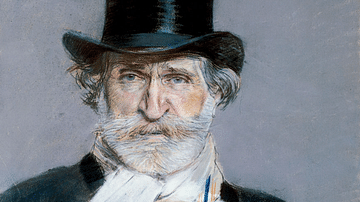
Definition
Giuseppe Verdi
Giuseppe Verdi (1813-1901) was an Italian composer best known for operas such as Rigoletto, La traviata, and Aida. Verdi is noted for his powerful scores and strong characters where anti-heroes lead the dramatic action through often complex...

Image
Darius III (Artistic Facial Reconstruction)
A photorealistic representation of the Persian king Darius III (r. 336-330 BCE) as he may have appeared. This reconstruction is largely based on artistic evidence like the Alexander Mosaic (c. 100 BCE) and coins minted during the reign of...
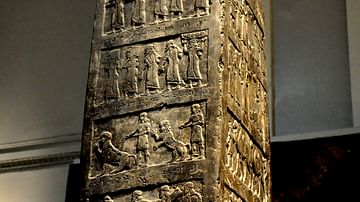
Image
The Black Obelisk of King Shalmaneser III
This obelisk was erected as a public monument in 825 BCE at a time of civil war. The relief sculptures glorify the achievements of King Shalmaneser III and his commander-in-chief . It lists their military campaigns of 31 years and the tribute...

Image
Demolition of the Monument to Alexander III in Moscow
Photograph of the demolition of the monument to Alexander III in Moscow, July 1918. As Tsarist Russia fell in 1917, so did the monuments of its monarchs. The colossal bronze statue to Alexander III was dismantled in July 1918 following a...
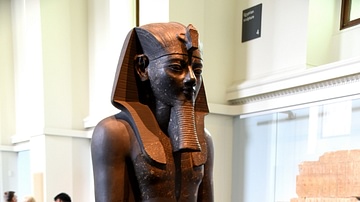
Image
King Amenhotep III
The enthroned pharaoh has idealized features and wears a striped head-cloth, false beard, and pleated kilt. A bull's tail, symbol of superhuman strength, hangs between the legs. Many Egyptian kings used the title of "bull" or "strong bull"...
![Throne Dais of Shalmaneser III [Front Panel]](https://www.worldhistory.org/img/c/p/360x202/10526.jpg?v=1733660592)
Image
Throne Dais of Shalmaneser III [Front Panel]
The front panel of this dais depicts Shalmaneser III (r. 858-824 BCE), (on the right) handshaking Marduk-zakir-shumi (r. 855 - 819 BCE) (left), king of Babylon. Both are surrounded by guards and stand below a fringed canopy supported by poles...
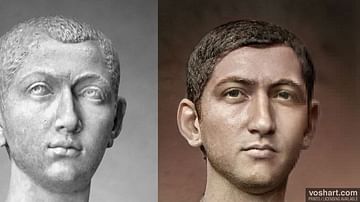
Image
Gordian III (Artistic Facial Reconstruction)
A photorealistic representation of what the Roman emperor Gordian III (r. 238-244 CE) may have looked like. Based on contemporary and near contemporary descriptions, as well as archaeological evidence. Pictured alongside the reconstruction...